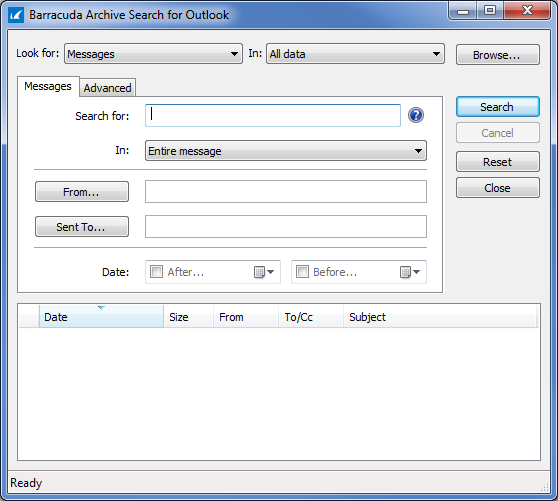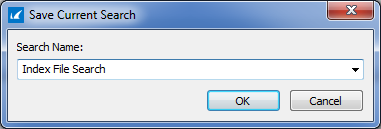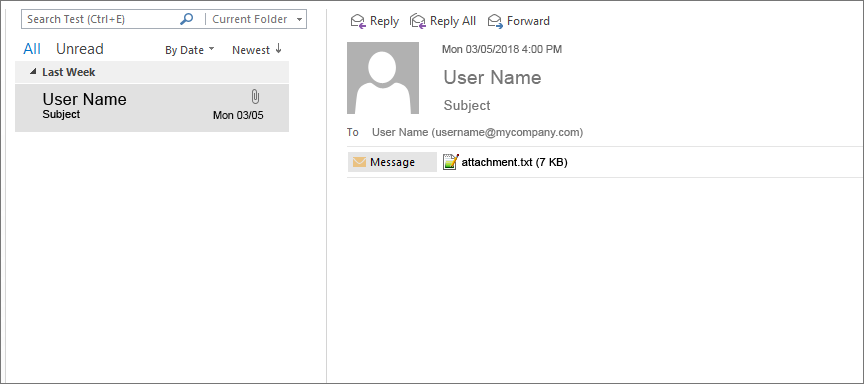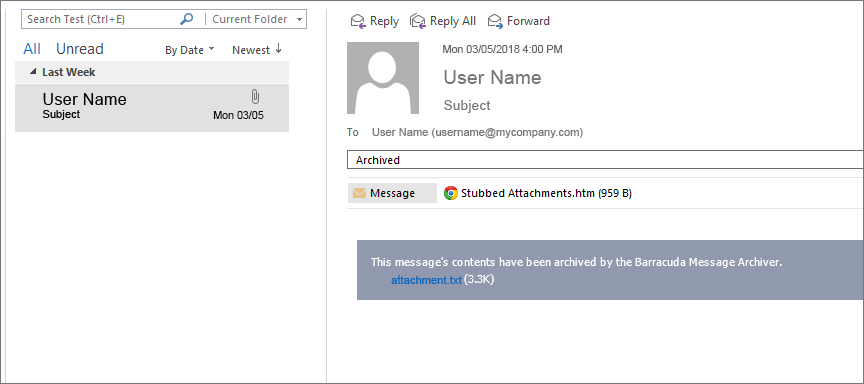This article refers to the Barracuda Message Archiver firmware 5.2 or higher, and the Barracuda Archive Search for Outlook version 5.2 or higher. The Barracuda Archive Search for Outlook supports Outlook versions 2013, 2016, and 2019. Note that Outlook for Mac versions are not supported.
Verify the Outlook Add-In version (available for download on the USERS > Client Downloads page) is the same major revision as the Barracuda Message Archiver firmware.
See also: Barracuda Outlook Add-In How to Video
If you are performing large or complex search queries, or a search for the purpose of litigation, Barracuda Networks recommends using the Advanced Search option from the BASIC > Search page in the Barracuda Message Archiver web interface. For additional guidance, see the following articles:
Search Archived Items
To search archived items, click the Search Archive ( ) icon to open the Barracuda Message Archiver Search dialog box:
) icon to open the Barracuda Message Archiver Search dialog box:

-
Look for drop-down menu – Select the type of item you wish to search for; select Any type of Item, Appointments, Contacts, Messages, Notes, Social Media, or Tasks
-
In drop-down list – Select the search location:
-
All data – Search everywhere in the selected item type
-
Specific folders – Click Specific folders, or click Browse to select one or more folders across all of your Archive stores in which to search; click OK to save your selections
-
Search for – Enter the search criteria; use logic operators and keyword search to further refine your search
-
In drop-down list – Select the search location:
- Entire message
- Subject or body
- Subject only
- Body only
- Keyword expression
The administrator can associate an LDAP user or group to a role and list of email addresses in the USERS > LDAP User Add/Update page. If addresses are excluded, and a configured user runs a search through Archive Search for Outlook, the following rules apply:
- If an address is excluded (blocked), the address does not display unless the mail includes the user performing the search to assure that a user can always see their own mail.
- The exclusion rules always take precedence; addresses that are allowed are searchable only if the exclusion rules do not block the mail.
- If a user is not configured and is a member of a group, then the allow and block rules assigned to that group apply to that user.
- If a user is assigned to a group, when the user logs in via Archive Search for Outlook, only that user’s mail displays. For example, if an LDAP user has the Auditor role, mail available to the Auditor role does not display.
Logic Operators
Build search queries using AND, OR, NOT, and -term.
When including more than one logic operator in a query, the order in which these terms are placed is important. For example,
- Add the first term "A", and then add term "and B"; the query searches as: (A AND B)
- Add a term "OR C"; the query searches as: ((A AND B) OR C)
- Add a term "AND D"; the query searches as: (((A AND B) OR C) AND D)
- Add a term "NOT E", the query searches as: ((((A AND B) OR C) AND D) NOT E)
Typically, you first build a population of results by using "OR" or "NOT", and then subtract items from that population by using "AND".
To force a different order of operations, place parentheses yourself using Keyword expression.
Keyword Expressions
When you enter a logic operator or a keyword expression in the Search for field, the rest of your search criteria is AND'd with the query. For example, if you enter "A AND -B" you can still specify a recipient in the Sent To field.
Table 1. Commonly Used search_field Keyword Expression Values.
| Term |
Description |
Search Type |
| to |
Search is limited to the To and Cc fields of each message |
Text |
| from |
Search is limited to the From field of each message |
Text |
| domain |
Search is limited to the domain names in the From, To, and Cc fields of each message |
Domain |
| subject |
Search is limited to the Subject line of each message |
Text |
| body |
Searches are performed in the Body of each message as well as in the contents of any message attachments |
Text |
| attachment |
Search is limited to the contents of message attachments |
Text |
| all |
Searches all fields and all data contained in each message |
Text |
| stored_size |
The actual message size on disk |
Integer number |
| size |
The raw size of the message |
Integer number |
| header_date |
The date header from the mail |
Text |
| header_barracuda_envelope_rcpt_pretty_name |
The envelope recipient's pretty name |
Text |
| header_barracuda_envelope_rcpt_user |
The envelope recipient |
Text |
| header_bcc |
The Bcc: header |
Text |
| header_to |
The To: header |
Text |
| header_in_reply_to |
The In reply to: header |
Text |
| header_barracuda_envelope_rcpt_domain |
The domain of the envelope recipient |
Text |
| header_from |
The From: header |
Text |
| header_barracuda_envelope_rcpt_message_mode |
Inbound / Outbound / Internal |
Text |
| header_barracuda_envelope_rcpt_addr |
Email address of envelope recipient |
Text |
| header_subject |
Subject of the email |
Text |
| header_message_id |
The message ID header |
Text |
| object_type |
Type of entry (calendar, mail, etc.) |
Text |
| body_excerpt |
The body of the email |
Text |
| attachment_name |
The attachment name |
Text |
| attachment_mimetype |
The attachment MIME type |
Text |
| attachment_extension |
The attachment's extension |
Text |
You may specify other search_field values as long as the correct name for the field is used. Consult Barracuda Networks Technical Support if you are unsure of the exact syntax.
The phrase can only contain a single item. However, that one item can be any one of the items described in Table 2.
Table 2. Phrase Values.
| Single Item |
Description |
Example |
| Text-based string |
A single string or phrase of text, to be matched exactly as entered. Valid formats are: a single word (with no whitespace) or a single double-quoted sequence of words (separated by spaces). |
-
Sales matches sales guide but not salesmen
-
"Reviews due now" matches performance reviews due now but does not match reviews for all employees are due now
|
| Integer number-based string |
A single integer string in bytes to be matched exactly to an index attribute as entered. Valid formats are: a single number (with no whitespace). To find a range, use a Compound Search String. |
-
stored_size:100 matches all emails with an actual message size on disk of 100 bytes
|
Single Wildcarded string |
Wildcards are characters in search strings that can match arbitrary characters in a search. They can only be used as part of a single word, and are not allowed as the first character of a search word. They are also not allowed in any double-quoted string containing multiple words (that is, spaces). Wildcards are not allowed as part of a phrase, or any search string that is comprised of more than one word, regardless of the use of double quotes. |
-
nation* matches this nation and nationality
-
luck? matches lucky but not luck
-
J???son matches Johnson but not Jason because the number of question marks denotes the exact number of characters to be matched
|
| Domain-based string (for to and from search_field only)
|
The domain part, or everything after the at-sign (@), of an email. |
-
example.com matches anyuse@example.com but does not match anyuser@sub.example.com
|
| Compound search strings |
A combination of two or more strings in any of the above formats (Text-based, Multi-Text, Wildcard, or Domain as applicable to the fields being searched) or with other Compound search strings, each separated by the keywords AND, OR or NOT. Surround logical groupings with parentheses as needed to determine order of operations. You can also use the Google syntax -term to exclude content.
Important
When creating compound search strings, the keywords 'AND', 'OR', and 'NOT' must be capitalized.
|
body:(Version AND (1.1* OR 1.2*)) matches items whose body contains, in any order, BOTH the word "version" and a word that starts with either "1.1" or "1.2"
(from:(barracuda.com OR barracudanetworks.com) AND body:datasheets) matches all items that were sent from any user in either the "barracuda.com" or "barracudanetworks.com" domains that ALSO contain the word "datasheets" omewhere in the body of the item -
(from:(barracuda.com NOT barracudanetworks.com) AND (Archiver AND -archives) matches all items that were sent from any user in the "barracuda.com" domains that ALSO contain the word "Archiver" somewhere in the body of the item
|
Table 3. Sample Keyword Expressions.
| to:chrislee |
All messages that have "chrislee" in the To or Cc fields. |
| to:patbrown@mycompany.com |
All messages containing "patbrown@mycompany.com" anywhere in the To field. |
| subject:"Barracuda Message Archiver" |
All messages that contain the exact phrase "Barracuda Message Archiver" anywhere in the Subject line. |
| domain:(barracuda.com OR barracudanetworks.com) |
All messages that were sent to or from any user in either the "barracuda.com" or "barracudanetworks.com" domain. |
| header_barracuda_envelope_rcpt_domain:sub.mycompany.com |
All messages sent to any user in the @sub.mycompany.com domain. |
Table 4. Sample Proximity Syntax.
For the keyword proximity syntax form, each keyword must be in a single Text-based string. Enter the keyword proximity syntax as search_field:"keyword keyword"~NumericValue, where search_field is the part of the email to search through.
| subject:"release Barracuda"~4 |
All messages containing "release" and "Barracuda" in the Subject field within four words of each other. |
| to:"Zac Britt"~4 |
All messages containing "Zac" and "Britt" anywhere in the To field within four words of each other. |
Table 5. Sample Fuzzy Search Syntax.
Fuzzy search allows you to find words that are similar to a specified search term. For the fuzzy search syntax, enter a single keyword followed by the tilde (~). For the fuzzy search syntax form, the keyword must be in a single Text-based string.
| roam~ |
All messages containing words similar to roam, for example, foam, roams. |
Search Criteria
The available search criteria differs based on the selected searched item type.
Table 6. Search Criteria.
| Search Item Type |
Criteria |
Description |
|
Any Type of Item
Appointments
Contacts
Messages
Notes
Tasks
|
Search for |
List of keywords on which to search. If multiple keywords are entered, only items with all of the specified keywords are returned. If keywords are enclosed in double quotes (" "), then only items that contain all of the keywords exactly as specified appear in search results. |
| In |
The part of the item in which to search for the specified keywords. Options vary based on the selected item. |
Appointments |
Organized By |
Appointment creator. Only those items organized by the specified user(s) are searched. Enter user names or email addresses, or click From to select users from an address book. |
Attendees |
Appointment recipient(s). Only those items that were sent to the specified user(s) are searched. Enter user names or email addresses, or click From to select users from an address book. |
| Date |
Date restrictions on the item. Search through only those appointments that were scheduled after and/or before the specified date(s). |
Contacts |
Email |
Message recipient(s). Only those messages sent to or copied to the specified user(s) are searched. Enter user names or email addresses, or click Email to select users from an address book. |
Messages |
From |
Message sender(s). Only those messages that were sent from the specified user(s) are searched. You can enter user names or email addresses, or click From to select users from an address book. |
| Sent To |
Message recipient(s). Only those messages that were sent to or copied to the specified user(s) are searched. Enter user names or email addresses, or click Sent To to select users from an address book. |
| Date |
Date restrictions on the item. Only those messages that were sent for after and/or before the specified date(s) are included in the search. |
Tasks |
Status |
Only tasks matching the selected status are searched for the specified text. |
| Due |
Date restrictions on the tasks. Only those tasks due after and/or before the specified date(s) are included in the search. |
You must specify at least one search criteria to complete a search; if you specify multiple criteria, only messages that meet all criteria are returned.
Keywords must be alpha-numeric characters, and are not case sensitive. Additionally, you can use wildcards to represent one or more other characters.
Table 7. Wildcards.
| Wildcard Symbol |
Represents |
| ? (single question mark) |
Specifies a single alphanumeric character. Question marks can be appended to search for a specific number of characters, for example, a???a returns five letter words that starts and ends with "a" or "A". |
* (asterisk) |
Specifies zero or more alphanumeric characters. For example, pl* returns "plane", "planning", etc. |
The first character of a keyword cannot be a wildcard, and wildcards cannot be used when searching for a quote phrase.
Advanced Search Criteria
Click the Advanced tab in the Barracuda Message Archiver Search dialog box to specify additional search criteria based on attachments and tags, and save your search criteria.
Any search criteria specified in the Advanced tab is used in conjunction with the criteria specified in the selected search item type search tab. Keywords in the Advanced tab must be alpha-numeric characters, and are not case sensitive. You can include wildcards in the Attachment Name field (refer to Table 3 below for more information).
Table 8. Advanced Search Criteria.
| Criteria |
Description |
| Attachments |
Number of attachments required in the messages in which to search. Options are Any, One or more, or None. |
| Attachment Name |
Name of the attachment for which to search. Only messages containing an attachment with the specified name are returned. |
| Tags |
Tag(s) on which to search. Wildcards are NOT accepted in this field.
Tags are defined and set on messages in the Barracuda Message Archiver web interface. If tags are defined and set on messages, you can use these tags in this field to quickly locate the messages. Options are Any or Specific tags. Contact your system administrator for more information. |
| Saved Searches |
Run a search based on a previously saved search.
- Create a Saved Search – Enter your search criteria, and click Save. Enter a name to represent the search, and click OK:

- Run a Saved Search – Select the desired search from the Saved Searches drop-down menu.
- Manage Saved Searches – Select Manage from the Saved Searches drop-down menu. You can select to delete or rename the saved search in the dialog that displays.
|
Message Results
All messages that match the specified criteria are returned in the search window. Double-click an item to open it in Outlook, or right-click to select an action to perform on the selected item, as described in Table 9.
Table 9. Available Actions.
| Action |
Description |
| Open |
Open the selected item in the standard Outlook view; double-click an item to perform the same action. Once an item is opened, it can be treated as any other non-archived item, including replying to and forwarding. |
Reply
Reply to All |
Creates a Reply or Reply All to the selected item in the exact same manner as Outlook. |
|
Forward
|
Creates a Forward of the selected item in the exact same manner as Outlook. |
| Forward as Attachment |
Creates a Forward as an attachment of the selected item in the exact same manner as Outlook. |
| Save As |
Save the item to your local system as a .eml file. |
| Copy to Folder |
Opens the Select Folder dialog box in Outlook from which you can select a folder to which to copy the selected item(s). Use Ctrl- or Shift-click to select and copy multiple messages in the returned search window to a folder. Select from your existing folders, or create a new folder for the selected item(s).
Important
If the Outlook window is hidden or in the background, you may need to click on the Windows taskbar and bring Outlook to the foreground to complete this action. |
Archive Messages
Items archived or stubbed using the Archive Search for Outlook buttons have a 300MB size limit.
Archive Search for Outlook includes an option to immediately archive a selected item(s) to the Barracuda Message Archiver. Additionally, if the Automatically stub attachments when archiving option is turned on, and you click the Archive Attachments ( ) icon:
) icon:
- A copy of the complete selected item(s) is stored on the Barracuda Message Archiver
- On your mail server, any message attachments that are in the body of an original message(s) are replaced with references to the archived attachment on the Barracuda Message Archiver
This process is known as "attachment stubbing" and helps to reduce the size of both your personal inbox and mail server storage.
To archive a message,
- Select the desired item(s) in Outlook, and click the Archive Attachments (
 ) icon; a progress window displays while the item(s) are archived.
) icon; a progress window displays while the item(s) are archived.
- Once the item(s) are successfully archived, any message attachments display as hyperlinks in the Outlook message preview. Click on a hyperlink to view the attachment.
- Double-click the archived message to open it in the message view; attachments display with icons as they normally would in Outlook.
- When you click the attachment hyperlink or double-click the archived message, the attachment is retrieved form the Barracuda Message Archiver, allowing you to view or save it in the same manner as an attachment in any other message.
- Using this feature immediately sends the message for archiving; however, if the Barracuda Message Archiver is currently in the midst of archiving other messages, it may be a matter of minutes or even hours before the archived attachments are available. Once archived, the message appears in Archive Search for Outlook search results.
- Forwarding an archived message automatically includes any attachments in that message as part of the forwarded message. However, a reply to such a message does not automatically include attachments, and the original archived message remains stubbed.
Apply a Category to Archived Items
If enabled by your administrator, a category is applied to all mail archived from the Archive Search for Outlook. For example, before archival, an item displays similar to:

After the item is stubbed with a category, in this example Archived, it appears similar to:

Restore Stubbed Content to Microsoft Exchange
To restore stubbed content to your Microsoft Exchange Server, click the Restore ( ) icon in the Outlook toolbar. When clicked, the selected stub content is restored to the Exchange Server and persists on the Server until the next stubbing job runs.
) icon in the Outlook toolbar. When clicked, the selected stub content is restored to the Exchange Server and persists on the Server until the next stubbing job runs.
 ) icon to open the Barracuda Message Archiver Search dialog box:
) icon to open the Barracuda Message Archiver Search dialog box:

![]() ) icon:
) icon:![]() ) icon; a progress window displays while the item(s) are archived.
) icon; a progress window displays while the item(s) are archived.

 ) icon in the Outlook toolbar. When clicked, the selected stub content is restored to the Exchange Server and persists on the Server until the next stubbing job runs.
) icon in the Outlook toolbar. When clicked, the selected stub content is restored to the Exchange Server and persists on the Server until the next stubbing job runs.